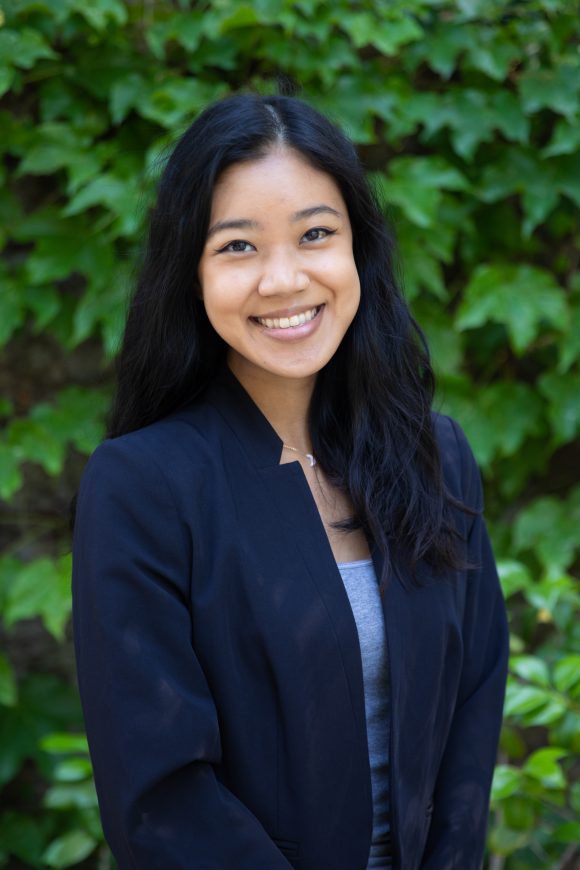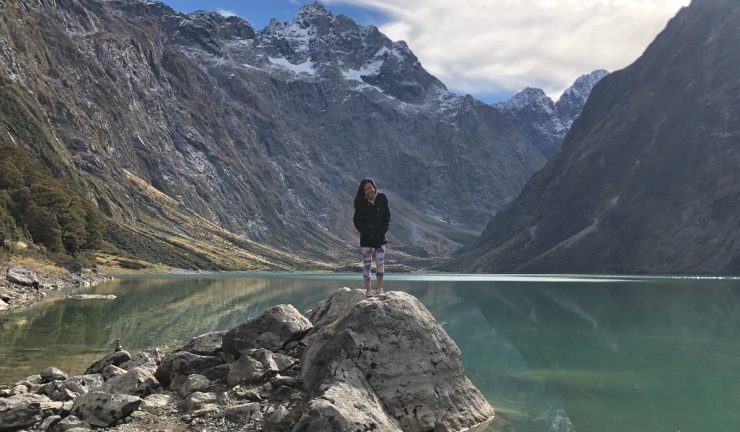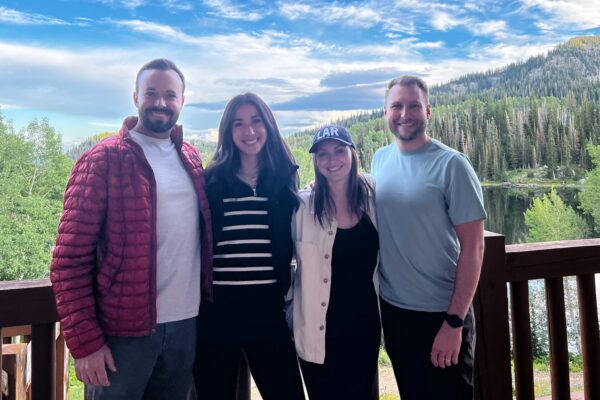
Laurel Tamayo ’21 was recently named one of Forbes’ 68 Climate Leaders Changing the Film and Television Industry
Tamayo is an Impact Campaign Consultant at Rare Entertainment Lab, a behavior change organization that specializes in climate change and conservation.
“My favorite part of what I do is being able to work on projects that intersect with my two passions: the environment and entertainment,” says Tamayo, who majored in environmental science and policy and minored in documentary film while at Chapman University.
“Half of my job is consulting screenwriters and studios about how to integrate climate-friendly behaviors into their content,” says Tamayo. “We take behaviors that have both high potential for adoption and high carbon emission reduction (like eating a plant-based diet and driving an electric vehicle) and suggest creative ways to add them to all types of genres – from a scripted comedy to a reality cooking show.”
The other half of her job is consulting on impact campaigns for Netflix’s green titles – such as “Down to Earth with Zac Efron” – and integrating climate change mentions on Netflix’s social media channels. One example of her work features actress Madelyn Cline talking about how climate change is affecting her home, family and the location of her show, “Outer Banks.”
View this post on Instagram
We asked Laurel to share more about her career and about her time at Chapman.
What does receiving this recognition from Forbes mean to you?
I remember when I would tell people (outside of Chapman) what I was studying, they would say, “that’s a weird combination.” When I would talk to my family about wanting this career, they strongly discouraged me. It was difficult at times, feeling like I did not have the support of many around me. This career has already been more than I could’ve imagined, but getting this Forbes recognition just legitimizes what I do to people outside of my field. I hope it brings more attention to the work my field is doing and inspires people to also think about how sustainability can be integrated into any job.
How did you get to your current role? Share a bit about your previous work experience/schooling that led to this position.
At Chapman, I studied environmental science and policy and documentary film. I knew I wanted to have a job that involved both those things ever since I watched the documentary “Racing Extinction” (that showed the connection between humans and species around the world) in high school.
There was one scene in particular about a bird on Kauai called the O’o. The man in the film played the bird call and said, “this is a mating call, but it’s one that will never be answered because he’s the last of his species.” Even though I was born and raised in Hawaii, I had never heard of this bird’s story, which shocked me.
The film had such an impact on me and inspired me to go vegan, use less plastic and change my lifestyle. I realized there was a real communication gap between climate scientists and the general public, so I wanted to work on projects like that that would inspire others to save the planet.
Before my current role, I worked on several projects like the Hollywood Climate Summit (annual gathering of the entertainment industry to address climate change), Good Energy Playbook (a guide for screenwriters to integrate climate into their films and TV shows) and the impact campaign for “I Am Greta” (which won Best Impact Campaign at the Jackson Wild film festival). These projects all used the power of entertainment to educate and motivate people to take action on climate change, and I continue to do that in my current role.
How did Chapman prepare you for your career? For life?
Chapman allowed me to study the two (pretty different) things I loved. When I was making my decision about where to go to college, Chapman was one of the only schools that would let me do that.
We had so many great guest speakers, and one of the things they would stress was the importance of connections. When I was feeling like I didn’t have the support I needed in terms of my professional goals, I started cold calling people on LinkedIn who had the jobs I wanted. Thankfully, most of them actually answered me and got on video or phone calls with me, giving me thoughtful advice and telling me about their experiences. I didn’t go into these meetings expecting anything but to get my questions answered, but a couple of them have become like mentors to me, and all of the jobs I’ve had since were a result of new connections referring me or hiring me.
Share about your involvements (clubs, study abroad, research, etc.) while attending Chapman and how it impacted your experience.
When I was at Chapman, I was involved in leadership positions for Kapamilya (Filipino club), Tri Delta and Veg Club (vegan/vegetarian club). These clubs allowed me to make friends who had different backgrounds and interests than me, and taught me how important community building is. Outside of my full-time job, I co-produced a short film about how climate change affects Gen Z’s mental health. I’m currently co-organizing an event for Mental Health Action Day that will bring people together to reflect on their emotions and learn about how to manage their climate anxiety.
I hate to be that person that says studying abroad changed their life, but here I am. I spent a semester in Wellington, New Zealand, and it was such an eye-opening experience for me. I joined the environmental and vegan clubs at Victoria University of Wellington and the local students taught me so much from the perspectives they had growing up someplace completely different from me. Even though it felt like their country was doing so much more to protect the environment than the U.S., they had this attitude that more could always be done.
Who was the most influential person for you at Chapman and why?
Dr. Jason Keller was the most influential person for me at Chapman. First semester, I started out as a biology major, but was curious about becoming an environmental science and policy major. I remember going to Dr. Keller’s office to learn about the major, and he invited me to an outing to a vegetarian restaurant with all of the majors. I felt so comfortable with the other majors, and we had a lot of the same interests and goals. After I changed my major, I got to attend many events that Dr. Keller put together with other students and alumni. Even before I took a class with him, I felt like he genuinely cared about me and the other ES&P majors. He made the ES&P major feel like a real community of change-makers that supported each other.
Did you have a favorite class you took at Chapman? Why was it your favorite?
My favorite class at Chapman was “Wildlife & Environmental Filmmaking”! It was the perfect combination of what I was studying, and I got to learn from Devyn Bisson, someone who was actively making environmental documentaries herself. I got to make a documentary about how sea lions in Southern California were being harmed by ocean plastic, have a discussion with Louie Psihoyos (the director of “Racing Extinction”) and learn how to communicate complex issues.
What advice can you share with students or recent graduates?
If you keep an open mind and keep in touch with the connections you make, so many opportunities will come your way. Because of my mentors, I learned about the Women’s Impact Alliance (formerly the Coaching Fellowship) and the Harvard Executive Education Program. The Women’s Impact Alliance provided me with a leadership coach for one-on-one sessions. My coach helped me figure out what I wanted in my career and my life. When I started, I was grappling with imposter syndrome, but she gave me the tools and confidence to be a better leader for my team and everyone we work with.
I’m currently working on my public leadership certificate at Harvard University’s Executive Education Program. I was able to attend my first course for free because I was awarded the Bacon Climate Leadership Scholarship. I got to take a class with people from 30 different countries who came from careers in different social justice issues, and I learned how to effectively connect my personal story with why I care about the environment and why the people I’m talking to should as well. When I graduated, I didn’t even know opportunities like this even existed, but because of the support system I now have, I’m getting to do things I never even dreamed of.
Read more about what Chapman University Alumni are up to on our Class Notes page — and submit your own life updates for a chance to be featured!




